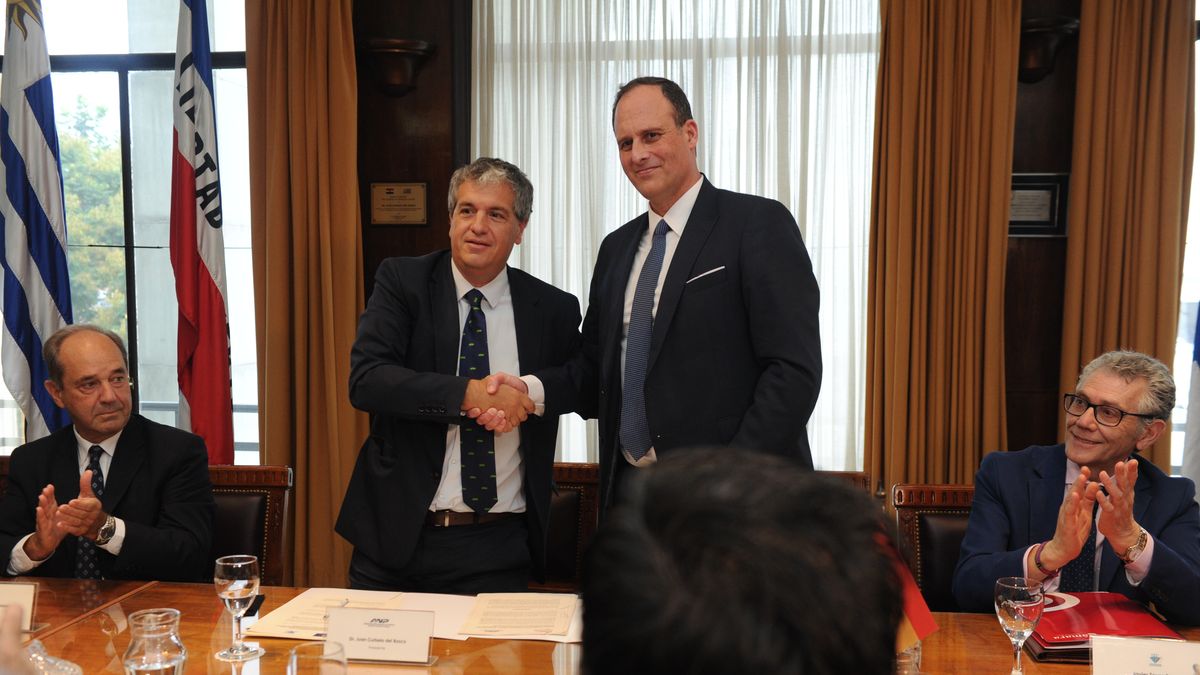The governments of Uruguay and Spain signed an agreement of understanding this Monday with the aim of promoting the potential of the fishing sector through an international agreement with the Port of Montevideo and the Fishing Shipowners Cooperative of the Port of Vigo; The announcement came in the midst of a crisis announced by the sector at the beginning of this year.
“It generates greater connectivity and positioning of the Port of Montevideoparticularly in the international fishing sector,” he said. Juan Curbelo, president of the National Ports Administration (ANP) during the signing of the agreement this Monday between the state agency and the port authority of Vigo, Spain.
In addition to Curbelo, the head of the Spanish Fishing Shipowners Cooperative was also present, Javier Touza; the president of the Chamber of Foreign Fishing Agents, Aldo Braidathe board of directors of the ANP and representatives of the Embassy of Spain and the Association of Galician Businessmen.
Embed – https://publish.twitter.com/oembed?url=https://twitter.com/compresidencia/status/1767238490729685211&partner=&hide_thread=false
An advance in connectivity and positioning
The president of the ANP highlighted the importance of signing agreements with international ports and, especially, with the Galician fishing industry, present in the South Atlantic. “Generating these commitments and agreements positions us in a better way. It has to do with the improvement in the infrastructure and the service provided in the Port of Montevideo”, he remarked.
On the other hand, he explained that the agreement will allow generating many Job positions and millions of dollars in profit. In addition, it will contribute to institutional links, the exchange of human resources and the promotion of environmental policies regarding the operations of the sector.
“The fishing industry requires that ports be conditioned for their task with a willingness to permanently improve the environment,” Curbelo explained.
The difficult moment of the fishing industry
The fishing industry is going through a crisis due to the High costs; According to the representatives, it is cheaper not to work and they assured that they will not resume work until there are solutions from the government.
At the end of last year the cameras of Fishing Industries and Fishing Shipowners denounced the different collective labor agreements and warned the Ministry of Labor and Social Securityl (MTSS) that would continue to reduce the days of work per year of the less than 200 who currently work. From the cameras they warned that they would reduce the days only to the four months of the harvest, the moment when expenses are covered.
“It is no use for any company not to work, but if I don’t go out fishing I lose 10 and if I go out I lose 15,” lamented the president of the Uruguayan Chamber of Fishing Industry (ICPU), Juan Riva Zuchelli, a weekly Search. On the other hand, he added that it is a situation that has been deteriorating for some time and that today “it is impossible to go out fishing, because it produces more losses than not going out.”
Españauru.jpg
Likewise, he assured that 90% of the fleet is unemployed and the person has unemployment insurance or license and that in February all people will go to the unemployment insurance Since the licenses they end In that sense, he commented that there are almost 2,000 people who are in this situation.
“It is a burden that the authorities should evaluate, because they will be like this until companies can go out to work, when feasible,” explained the president of CIPU, who assured that this measure has no intention of press, nor is it corporatist, But companies actually agree that It is not advisable to go out to work.
The fishing industry has the possibility of export to more than 70 countries, which allows it to considerably increase the amount of product exported. However, the problems in the sector prevent them from growing within their industry.
Among the main problems are the costs associated with Employer contributions for the bonus retirement, as well as the contributions to the State Insurance Bank (BSE). This means a premium of 11% on the real wages of all workers.
On the other hand, they claim Dinara by the discretion of the fines that applies, as well as the costs, criteria for granting, management and renewal of permits. In that sense, they asked to halve the costs and that the fines become warnings while the normative and they change costs.
Source: Ambito




